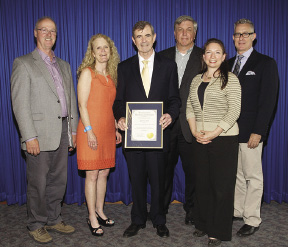On May 23rd, secretary of the Commonwealth and chairman of the Mass. Historical Commission William Galvin presented an award to Trinity Financial for the rehabilitation and adaptive reuse of Appleton Mills. The 35th Annual Preservation Awards Ceremony was held at the Massachusetts Archives Building in Dorchester. Appleton Mills was chosen based on the adaptive reuse of the former Appleton Manufacturing Company property constructed in the early 1900s. Trinity Financial worked in collaboration with Copley Wolff Design Group and ICON Architecture with the design for phase one of the Hamilton Canal District Master Plan.
"The projects the commission is recognizing this year are particularly diverse and represent the many creative ways that significant historic resources are being preserved across the Commonwealth," said Secretary Galvin. "The dramatic transformation and restoration of Appleton Mills has paved the way for future revitalization in the Hamilton Canal redevelopment area."
The new Appleton Mills opened in 2011 after transforming the historic mill from a crumbling industrial relic into an arts community of 130 live/work housing units adjacent to downtown Lowell. The project goal was to create an affordable and attractive place to live while capturing the energy and vitality of the city.
"We are honored to receive this award as it was a unique and challenging project for the whole team involved," said project manager Abby Goldenfarb of Trinity Financial. "The Design Teams were vital to the project's success as we had a vision for the end result and they used their expertise and experience to bring the mill to life."
Considering the beauty and tranquility of the adjacent canal, Copley Wolff Design Group's landscape plan of the mill yard incorporated a symbolic use of water, which powered the original turbines, while emphasizing the gateway connection across the canal. Additionally, rain gardens partially enclosed by stacked block seatwalls, alluding to canal walls, and a lighted fountain running parallel to the original penstocks complimented the redesign of the historic building.
"The redevelopment of the Appleton Mill was designed to attract local artists while preserving it's historic nature, said John Copley, Principal at Copley Wolff Design Group. "Keeping that goal in mind, we incorporated the rain gardens and fountain to compliment the Hamilton Canal."
The Hamilton Canal District Master Plan is a proposed pedestrian friendly, transit-oriented, mixed-use master plan that aspires to create significant employment and housing opportunities to strengthen and diversify the city of Lowell. To be implemented over the next decade, it includes a total of 1.6 million s/f of new development over 13 acres and possible extension of the trolley system. Upon completion, it will provide many opportunities to enhance the public realm.
In addition to the Mass. Historical Commission Preservation Award, the Appleton Mills project was previously awarded the J. Timothy Anderson Award for Excellence in Historic Rehabilitation by the National Housing and Rehabilitation Association.
Shown (from left) are: Larry Sparrow of Trinity Financial, Maureen Cavanaugh of Epsilon Associates, Inc., William Galvin, the Secretary of the Commonwealth of Massachusetts, John Copley of Copley Wolff Design Group, Kendra Halliwell of ICON Architecture, Inc. and Kevin O'Neil of ICON Architecture, Inc.









.png)